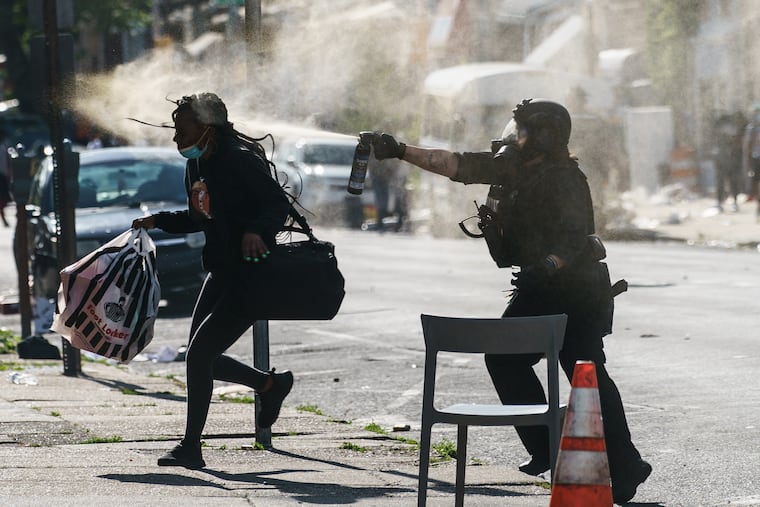A year ago, 52nd Street was teargassed by police. Now we’re fighting back. | Opinion
To make change in policing locally, we need to look in new directions.

This week marks the one-year anniversary of the 2020 Black Lives Matter uprisings. One year since the public flooded the streets, calling for an end to police impunity, the defunding of police budgets, and investment in Black people. And one year since our communities — including mine on 52nd Street — experienced the severe state repression that followed that call.
I have never seen or felt anything like the seven-hour police occupation of my predominantly Black neighborhood, Cobbs Creek, on May 31, 2020. Although neighbors screamed, “Kids live here! Please don’t shoot,” tear-gas canisters flew relentlessly through the air, landing on residential streets. Gas quickly filled the nurseries where babies napped and the hallways where everyday people did everyday things. To escape the tear gas, families were forced from their homes into the street, where police were indiscriminately shooting people with rubber bullets. The cops said they were there to protect us from rioters — but it was them we feared.
» READ MORE: City offers $87K settlement to West Philly family teargassed by police during last year’s civil unrest
The thing that struck me most about that day was the unity I experienced with neighbors. People sprung into action: bringing milk for our stringing eyes, picking us up off the ground, even as they were stumbling. Some made makeshift protest signs and confronted police directly on Chestnut Street as the tear gas finally subsided. At one point, we all decided — without speaking — to hold the line at Chancellor Street to ensure tanks didn’t press farther into our neighborhood. Without realizing it, we all became activists that day.
Since then, many of us never stopped organizing. The rest of the year became a blur of planning meetings, public hearings, and protests. For some, including myself, the constant organizing was a trauma response — a way of finding agency within the crushing sense of societal collapse. For others, it was a matter of survival. Either way, that day was a portal from which we can’t return. We are on the other side of an awakening. We now know that policing, as it stands, does not keep us safe. Policing, as it stands, is a mechanism for insulating white supremacy and repressing the poor and working class.
This time it’s not just the young “radical” few who believe what Black and brown communities have always known. After months of watching police and vigilante impunity in real time and seeing several lawsuits alleging constitutional violations by police, the truth has become undeniable. There is a growing consensus that our current standards of justice and public safety need an urgent transformation.
While consciousness has expanded, those of us who have stayed in the fight have come to realize that the marching and testifying to appeal to local or federal leadership hasn’t changed the foundations supporting the brutality of policing. Because our democracy is owned by the people who built the systems we seek to disrupt, the hands of our leaders are tied.
As Malcolm X pointed out, we will always be limited in our ability to fight for the rights of Black Americans through civil rights, because that requires asking for justice from the very systems built on our oppression. Instead, just as the NAACP and W.E.B. Du Bois appealed to the United Nations, we must claim the rights and freedoms entitled to us in the Universal Declaration of Human Rights — and join hands with survivors of state repression around the world to upend this broken country. We must recognize that, just as America weaponizes diplomacy to wage long-haul wars abroad, the police are its mechanism for shoring up the empire at home.
» READ MORE: A year after George Floyd’s murder, Minneapolis remains scarred and divided
This is why lawyers from the Stern Community Lawyering Clinic at Drexel University’s law school and the American Civil Liberties Union of Pennsylvania, along with community members, organized an appeal to the U.N. This winter we submitted a letter of allegation to U.N. experts documenting Philadelphia’s human-rights violations in response to the unrest during the summer of 2020. The letter requested that the U.N. initiate a formal investigation, which it did in January of this year. Moreover, the organization released a joint statement from 23 human-rights experts imploring the United States to address systemic racism and enact reforms to stop police violence, citing the Philadelphia teargassing incidents as standout violations.
Although the city has not yet responded to our allegations, this process represents a significant shift in public discourse, as it marks the first time that a human-rights body at the UN has echoed the aims of the Black Lives Matter movement. We cannot deny the absolute gravity of what we have achieved, nor lose momentum in pursuing this movement as a global one for human rights.
As we approach the one-year anniversary of uprising in our city, I hope we continue to carry forth the unfinished work of those who fought for liberation long before us and center our battle on the human rights to which we have always been entitled.
Amelia Carter is an organizer for the Philly Human Rights Appeal event, Human Rights Violated Here, scheduled for May 31. She is from Philadelphia and lives on 52nd Street.